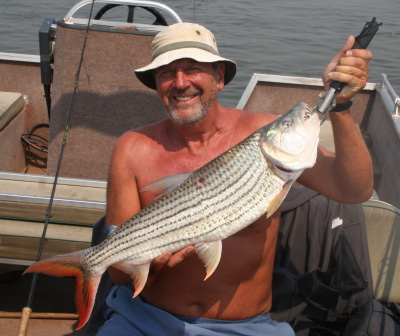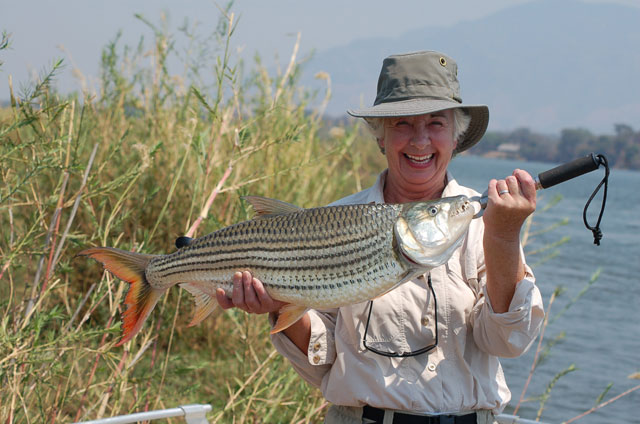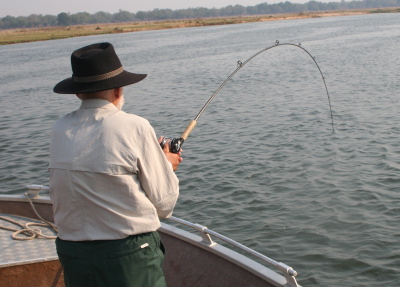 Well! Not exactly the Royal Family, but with guests at the ‘Royal,’ the ‘Royal Zambezi Lodge’ to be exact, in Zambia.
Well! Not exactly the Royal Family, but with guests at the ‘Royal,’ the ‘Royal Zambezi Lodge’ to be exact, in Zambia.
My late wife Kay and I had always had a hankering to visit Africa and do the safari ‘thing,’ as well as obviously to sample the fishing out there, which is described by several authors as, ‘Fabulous.’ What deterred us was the tales of being eaten alive, not by the local human population, but by the bloody insects – four-engined mosquitos and such. Also there was all the talk going around of AIDs, and other unwelcome invasions to visitors to the African Continent, so Kay and I resisted the temptation. I wish I hadn’t as Kay would have loved it, as I did when John Wilson persuaded me that there was no problem. Not in Zambia anyway, and so I joined him on a trip there last year with my friends Richard Ogden, John Found, and Pete Reading.
Apart from Pete, the three of us had sampled fishing abroad on long-haul flights many times, but it was a new experience to Pete, and so before the African trip we lugged him off to Canada to sample the carp there, and for me to get a hug from the gorgeous Tessa, my young friend from Essex, who was running a motel over there and catering for carp anglers. Pete, apart from his mild fear of flying, (he’s terrified really) was so impressed with the experience that fishing abroad can give, that now he can’t get enough of it. He’s charging off everywhere to sample 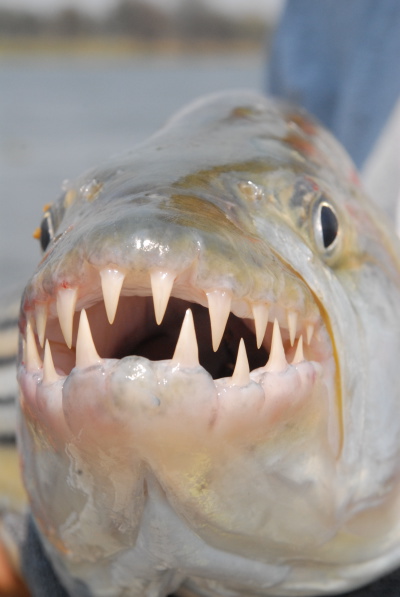 different fishing to that which he has been so attached to over here in the UK for so long, and with Africa he was absolutely enthralled. He loved the fishing, but he also appreciated the sheer aura of the part of Africa we were visiting. The apparently untouched landscape, the great River Zambezi, the animals so attuned to the land and river, and naturally the fish we were after that had that good fighting ability that included leaving their element and trying to fly. They are a very beautiful species, providing, like some beautiful women, they keep their mouths shut. Our quarry, the Tiger fish, had a set of gnashers that made Piranhas look docile creatures, and, as Pete pointed out to me, an unusual mechanism to open and close their fearsome jaws. I argued about that, but Pete was right.
different fishing to that which he has been so attached to over here in the UK for so long, and with Africa he was absolutely enthralled. He loved the fishing, but he also appreciated the sheer aura of the part of Africa we were visiting. The apparently untouched landscape, the great River Zambezi, the animals so attuned to the land and river, and naturally the fish we were after that had that good fighting ability that included leaving their element and trying to fly. They are a very beautiful species, providing, like some beautiful women, they keep their mouths shut. Our quarry, the Tiger fish, had a set of gnashers that made Piranhas look docile creatures, and, as Pete pointed out to me, an unusual mechanism to open and close their fearsome jaws. I argued about that, but Pete was right.
All of us had a great time with John Wilson and his guests, but we were only there for a week, so Pete and I, perhaps more easily influenced than the others about the attraction of the place, although I would rather say we are more appreciative of the natural world, decided we would visit the Zambezi again, but for two weeks.
As an octogenarian I plead senility, incompetence and the inability to engage in the ‘button-pushing’ era, so poor old Pete was left to arrange the trip, and he did a good job. He found a Lodge that was almost as cheap for a fortnight’s holiday as our previous trip cost us for a week, and that is how we ended up at the ‘Royal Zambezi Lodge,’ and we enjoyed the experience even better than our first trip as we were looked after like ‘Royalty’.
On our arrival at the Lodge I was so knackered after a night flight, that I resisted the temptation to go fishing for the afternoon and retired to my bed after a good lunch. Pete, of much younger stock, couldn’t get in the boat quick enough and clobbered his first Tiger fish of our trip, a beauty of 12lb, but as I told him, it wouldn’t be recorded in my book as without me fishing he had no competition, or the value of me telling him how it should be done. He cannot argue that one as when I was in the boat with him he caught much more with my constant instruction, but not according to plan, as he also caught a lot more than I during the holiday. I consider that at my age I have the right to tell everyone how to fish, and I’m always right anyway.
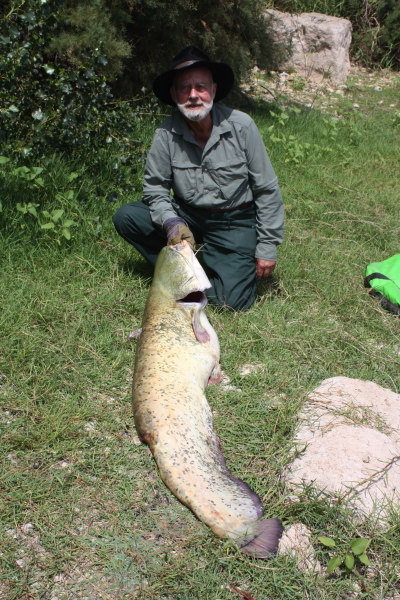 Pete did miss out on one experience though, as when he went fishing and I returned to our accommodation after lunch for a ‘kip,’ immediately outside of the room’s verandah appeared a bull elephant, happily munching away on the leaves of a tree. It did not seem at all concerned as I quietly took pictures of the animal, taking care to move slowly and not act in any way that would appear threatening.
Pete did miss out on one experience though, as when he went fishing and I returned to our accommodation after lunch for a ‘kip,’ immediately outside of the room’s verandah appeared a bull elephant, happily munching away on the leaves of a tree. It did not seem at all concerned as I quietly took pictures of the animal, taking care to move slowly and not act in any way that would appear threatening.
There was however a bit of a problem with the accommodation. Not the room, the view right by the river, or the comfortable bed; the problem was Pete. It was like being in a field where trees were being felled during the hours of darkness, only worse, as the ‘chainsaw’ never stopped emitting its tune. It was a good job that I had a sleep during the afternoon, which did allow me to be reasonably awake for the next day on the river working for the Tigers. That problem did show the consideration that the Lodge had for the comfort of its guests though, as we had been joined in the boat by the Lodge Manager, and during conversation he asked how we had slept. When I mentioned that it was ‘badly,’ due to my fishing companion, he arranged for us to have separate rooms. Great!
The room that was given to Pete for his particular nightly music was on a hill, and it is well known that lions are attracted to snoring, so every morning the guides would start their safaris for the day outside Pete’s accommodation where there were about 30 lions each morning enjoying the concert. Honest!
Having the Lodge Manager with us on the first day was great, and we were obviously happy about that as he was a keen and experienced angler, knew the river, and gave us a lot of information. Unlike Pete, I was interested in catching one of the river’s catfish species, the Vundu, and the Manager was well ‘keyed-up’ on that species which was helpful to me personally, as on the previous trip I had hooked one which got snagged and lost, but it had given me an idea of the power of the beast, and I wanted some more of that. John Found and one of the other anglers had caught Vundu on our first trip to Africa, so I had to regain some confidence, and possibly would not have to endure any banter about my angling inabilities from any of my mates if on this trip I got a Vundu.
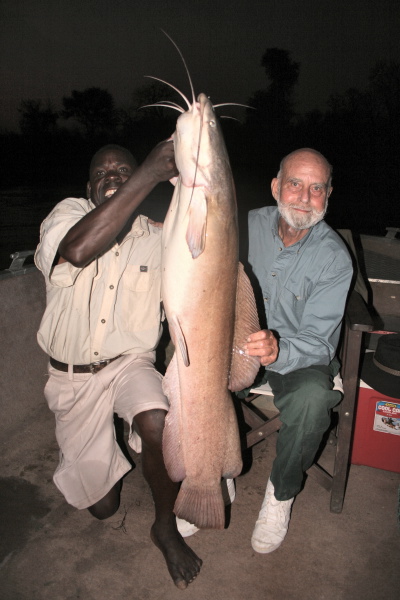 The only other regular anglers staying during our fortnight at the Lodge were a husband and wife team from Yorkshire, a couple of great people and full of fun, and as guests with similar interests we joined each other for meals – and of course, angling banter. We had a lot of fun in their company, and they had, as we did, a lot of fun with the fishing as they caught plenty of Tigerfish. They also sometimes went after Tilapia, of which there were several varieties, all lumped together as ‘Bream’ by the locals. They were very good eating, so when they returned to the Lodge with a bag of those they were well in the ‘good books’ of the Lodge staff. In the course of the fortnight I can say the four of us became good friends. We have already made up our minds to re-visit the Lodge next year and they have said they want to be there at the same time. That’s a nice compliment.
The only other regular anglers staying during our fortnight at the Lodge were a husband and wife team from Yorkshire, a couple of great people and full of fun, and as guests with similar interests we joined each other for meals – and of course, angling banter. We had a lot of fun in their company, and they had, as we did, a lot of fun with the fishing as they caught plenty of Tigerfish. They also sometimes went after Tilapia, of which there were several varieties, all lumped together as ‘Bream’ by the locals. They were very good eating, so when they returned to the Lodge with a bag of those they were well in the ‘good books’ of the Lodge staff. In the course of the fortnight I can say the four of us became good friends. We have already made up our minds to re-visit the Lodge next year and they have said they want to be there at the same time. That’s a nice compliment.
Pete and I found the fact that the Lodge is not ‘fenced’ in any way and therefore open to the wanderings of the wildlife, to be absolutely fantastic, as they have freedom excluded to them when in captivity, even when in a place like Longleat. Elephants are the commonest visitors, but hippos are regular visitors too on most nights, and the occasional lion and several other animals may wander through, mostly at night, so apart from our angling interests we were enthralled by just being where nature is still pretty ‘raw’. We even took time off from the fishing to experience safari drives to see even more animals, and some lions which took absolutely no notice of us even though we were only a few feet away in the truck. Pete wouldn’t get out and stroke them for me so that I could get a good picture though.
Tigerfish are very efficient predators, so fishing for them can be by several methods, as can most of our predatory species. Some anglers like to fish the fly while others are happy to chuck bits of metal, or wood, or plastic at them, but Pete and I resisted fly fishing, spinning, or fishing with plugs, and stuck to drifting with pieces of fish. We would catch a small species called Chessa, and they were chopped into chunks or ‘flappers,’ not that it seemed to make much difference to takes, apart from the hooking of such a bony-mouthed creature.
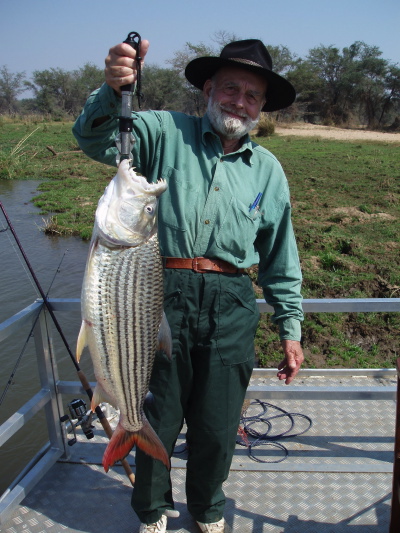 The guide would position the boat where there would be a long drift down a strong current, with a depth of a couple of metres upwards to perhaps 4 metres. There were extensive shallows and islands, so on some of the trips up or down the river to different areas, the guide would be traversing the width of the river to avoid them, at fair speed, so he had to know it well. On these journeys we saw many animals as the river is essential to their survival, especially during September when we visited, as there is virtually no rainfall. The colour of the river was fairly clear too, so we did not have a worry that our baits would not be seen at a reasonable distance, and that is a great advantage too for those who wish to fly fish or spin.
The guide would position the boat where there would be a long drift down a strong current, with a depth of a couple of metres upwards to perhaps 4 metres. There were extensive shallows and islands, so on some of the trips up or down the river to different areas, the guide would be traversing the width of the river to avoid them, at fair speed, so he had to know it well. On these journeys we saw many animals as the river is essential to their survival, especially during September when we visited, as there is virtually no rainfall. The colour of the river was fairly clear too, so we did not have a worry that our baits would not be seen at a reasonable distance, and that is a great advantage too for those who wish to fly fish or spin.
The Zambezi is a big river. A mile wide in some parts, but we are only allowed to fish half-way across as the other side is Zimbabwe, but that does not stop the animals such as elephants, crossing where it is shallow enough. I was amazed when I was told that lions would cross the river too, and they had to swim, as nowhere was it shallow enough for them to ‘paddle’ the whole way across. I had always believed that lions hated water, as do most of our domestic ‘pussies,’ although I know that tigers like water, as does everybody now with the wonderful television programmes we view to bring wildlife into our living rooms.
Tiger fish, as the reader will have gathered, are a pretty ‘gamey’ fish, and a very good fish is one that tops 10lb, (Not to be confused with the Goliath Tiger fish) but Pete had a stack of fish over that, to 16lb, but although I managed 14lb on the previous trip, I couldn’t beat 12lb this time or catch as many as him. That makes it difficult, as Pete will stop listening to me telling him how to fish if it happens again. Of course I claim that it is the casual way I fish, and to back that up, unbeknown to me, Pete took a picture of me with my legs up, ‘rabbitting’ to the guide while the boat drifted down, with the rod held to fish down the drift, bouncing bottom with little effort on my part – while he was continually casting and working the bait. Well! How many do you want to catch at my age? My method caught enough.
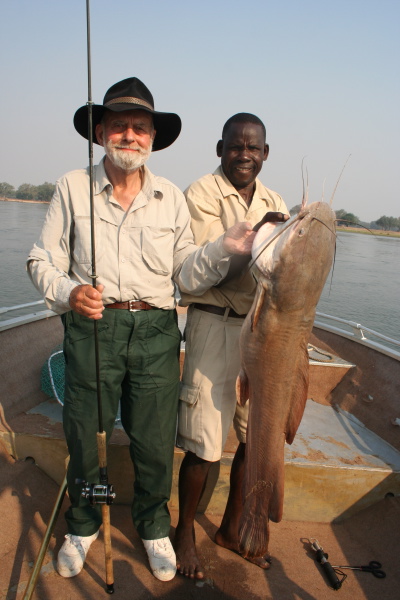 As I have already said, I did want to catch a Vundu though, and so for a few days we spent the last hour of the day’s fishing trying for that species. Well I did. Although we were anchored Pete still flogged away for Tigers, and added another double to his list with a few others a bit smaller.
As I have already said, I did want to catch a Vundu though, and so for a few days we spent the last hour of the day’s fishing trying for that species. Well I did. Although we were anchored Pete still flogged away for Tigers, and added another double to his list with a few others a bit smaller.
The previous month I had spent a week in Spain to fish for cats, but although I didn’t catch any of the big ones, I was disappointed with the fight they gave for the size that I did catch, compared to other species of similar size, but what I had seen of Vundu, they were a totally different proposition.
I was told that a favourite bait was chicken guts, chunks of fish, smelly fish heads, and the like, but I opted for the cleanest bait that I have ever put on a hook – soap! It was an ideal bait to use for the last hour of fishing too, as it has to be well moulded, and so I was the only one that returned to the Lodge with spotlessly clean hands. Apparently the attraction of the soap provided is that it is made partly with fat. Whatever, on the few occasions I fished two rods to try soap on one of the rods and smelly fish on the other, only the soap had any takers.
Although Vundu can reach 60 – 80lb I was told, the average size taken from the Lodge was 20lb, but as with the Wels catfish that I had caught the previous month, I was not too worried about size as it was a species I had not yet caught. If a big one came along though I would be only too pleased.
We tried various spots suggested by the guide without success, but I had seen a swim that seemed to me, for various reasons, to be the sort of place a Vundu might work for his grub. When we tried that, within about 15 minutes I had a run on the soap, and did that fish fight considering it was on fairly powerful gear. We had to up-anchor and follow the beast, and I made sure the guide took the boat well away from the shoreline and the obvious snags, with a successful conclusion. I must admit that I expected a fish of at least 40lb by the way it scrapped, but it was only 30lb. That did however confirm my expectation that this creature would be a better fighter than the Spanish variety of an equivalent weight.
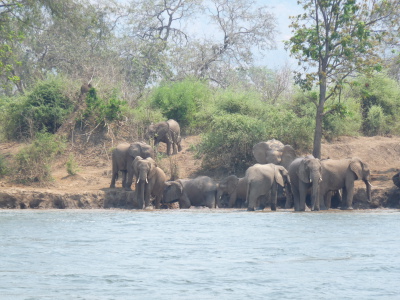 Fate being the format of all life, it would stand to reason that the next Vundu that I hooked would be on the tackle that I was using to fish for Tigers. We were in the middle of the river, drifting our strips of Chessa slowly on the edge of a fast run but over a deep hole, when the Tiger fish I hooked seemed to stay down deep and make an unbelievably long run without leaving the bed of the river. This was obviously not a Tiger, and the guide and I both said in unison, “Vundu,” so the motor was started ready for the chase if it turned out to be one of the big boys. Unfortunately it wasn’t, but at 36lb it still took about half an hour to beat, and we finished the battle a long way from the point of hook-up. Between enjoying the power of the fish, and instructing the guide where I wanted the boat positioned so that I could keep it away from the snags, I was in my element. Fabulous!
Fate being the format of all life, it would stand to reason that the next Vundu that I hooked would be on the tackle that I was using to fish for Tigers. We were in the middle of the river, drifting our strips of Chessa slowly on the edge of a fast run but over a deep hole, when the Tiger fish I hooked seemed to stay down deep and make an unbelievably long run without leaving the bed of the river. This was obviously not a Tiger, and the guide and I both said in unison, “Vundu,” so the motor was started ready for the chase if it turned out to be one of the big boys. Unfortunately it wasn’t, but at 36lb it still took about half an hour to beat, and we finished the battle a long way from the point of hook-up. Between enjoying the power of the fish, and instructing the guide where I wanted the boat positioned so that I could keep it away from the snags, I was in my element. Fabulous!
The spinning rod that I was using for Tigers was my favourite rod for spinning for salmon in the UK, and dealt with the Tigers admirably, but it was a trifle light for the power of a Vundu, and I had to use it to its maximum and not ease up on the power at all, or else I would still be playing the thing. Kay had an equivalent rod which I took to Africa for Pete to use, and he really liked it, and took his largest and several other ‘doubles’ on it. Kay would have been pleased. While writing this article, as we are going over next year to sample the fish of the Zambezi again, it’s Tiger fish and Vundu, I am already psyched-up and catching them in my mind.
Perhaps I should mention that I did find some slight difficulty in using soap for bait, and retrieved a couple of times to find the bait had gone, so next year I’m going to use the same method used to fish with salmon eggs for sturgeon. The salmon eggs are placed within some stocking mesh which is then tied into a ball of whatever size is required. I’m going to have a lot of fun getting hold of the ladies stockings. Might be better than the fishing?
Dave Steuart
